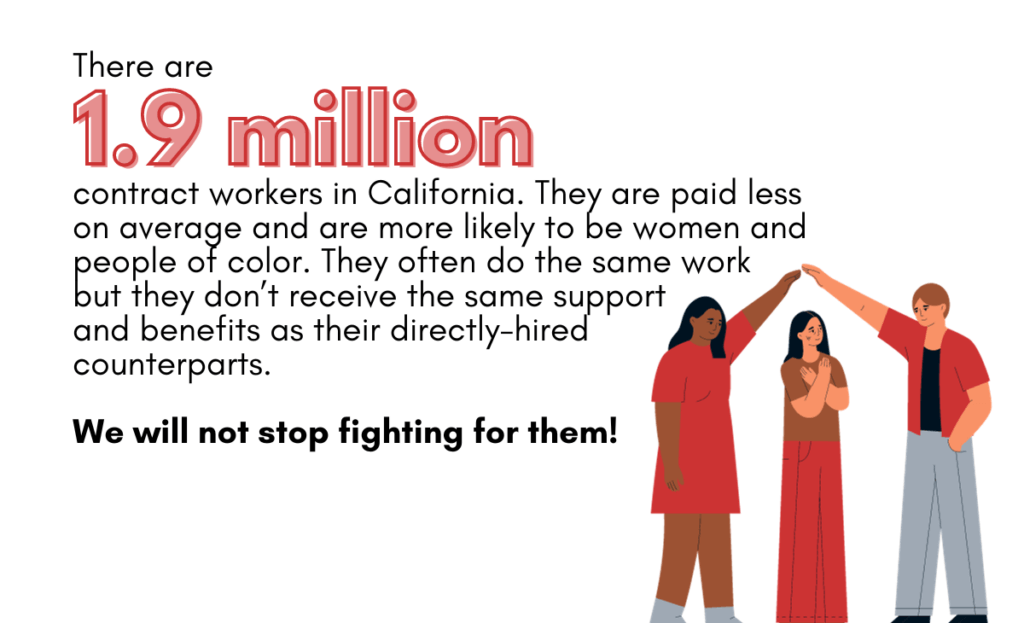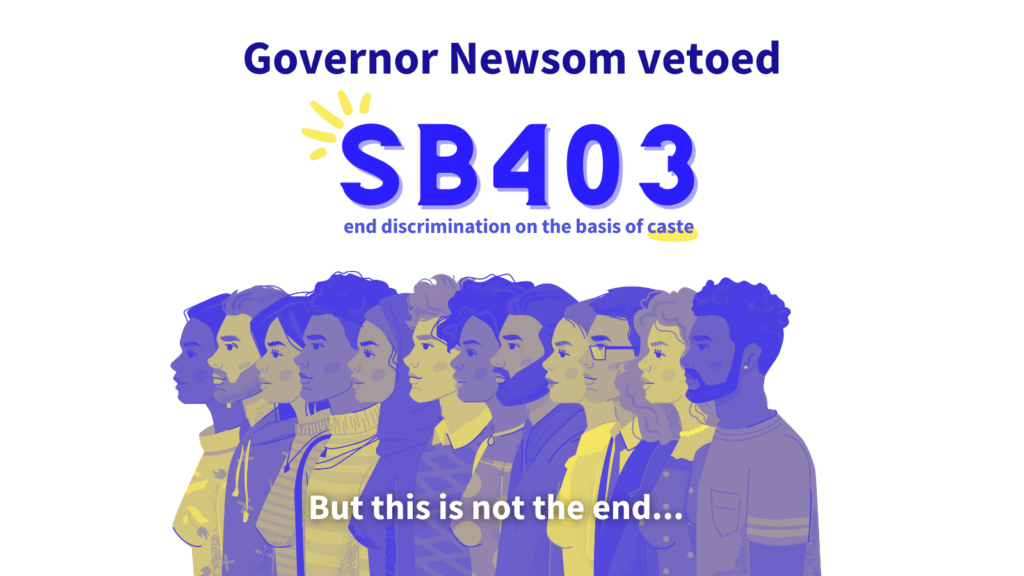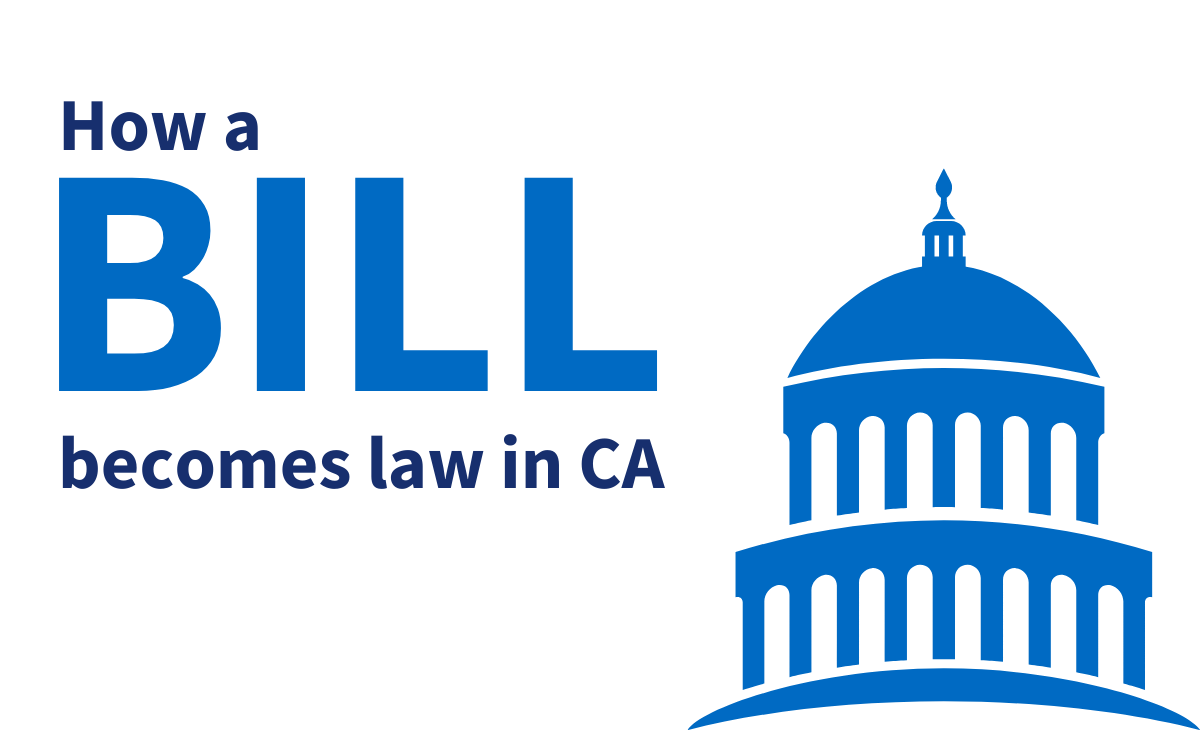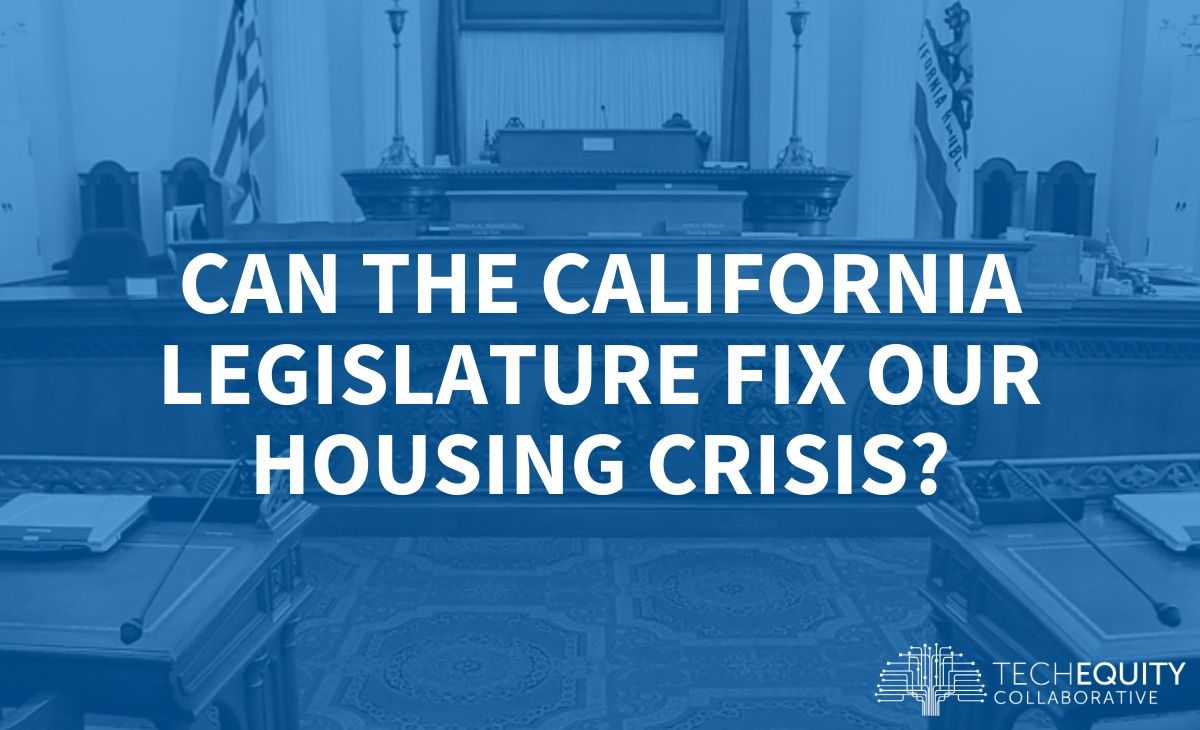We Will Continue to Advocate for Equitable Economic Prosperity

At TechEquity, we envision a world where the growth of the tech industry creates economic prosperity for everyone. We believe that every worker matters and should be treated with dignity. In order to bring these ideals to life, this year we supported bold public policy to provide guardrails and safety nets where needed.
While California Governor Gavin Newsom vetoed our two pieces of sponsored legislation—the Protect Laid-Off Workers Act (AB 1356) and Ending Caste Discrimination in California (SB 403)—we’re still very proud of what we were able to accomplish and are committed to keeping the drum beat for these issues going. As for our priority legislation, we got some big wins for worker and housing protections thanks to our coalitions and community!

AB 1356 – Protect Laid Off Workers Act
AB 1356 would have California’s Worker Adjustment and Retraining Notification (WARN) Act by expanding protections for workers impacted by mass layoffs. Specifically, it required that companies give 75 days notice prior to a mass layoff, guaranteed that workers do not have to waive their legal rights to be protected by the WARN Act, and extended mass layoff protections to contract workers.
Why we sponsored it
As part of our Contract Worker Disparity Project, we found that contract workers in tech were disproportionately women, non-binary, and people of color. This laborforce is also paid less and given little to no benefits compared to their direct-hired counterparts. It’s becoming a more and more common practice to utilize these contract workers—hired out by third-party contracting agencies—so that companies can avoid liabilities and protections like the WARN Act. Today, California’s contract and temporary workforce comprises approximately 1.9 million employees. In 2019, contract workers at Google outnumbered direct-hire employees, 121,000 to 102,000.
When the tech industry started laying off people en masse in 2022, these workers were left in the lurch. Twitter, the poster child of recent downsizing, laid off 3,700 workers in November of last year—a move that drew headlines and widespread concern. Largely missing from the coverage, however, was that 4,400 contract workers were also laid off, and sent home with nothing. Meta—noted for their generous layoff packages— did not include contract workers such as campus cafeteria workers, who had to urge the company to provide severance.
Moreover, existing protections must be updated to reflect workers’ current economic reality: a third of Californians don’t have enough savings to cover basic necessities in the event of an unexpected job loss. 8 in 10 Californians who can’t afford basic needs live in working families. For many low- and middle-income families, an unexpected job loss can mean financial catastrophe.
This large and disproportionately diverse workforce deserves access to layoff protections and all workers deserve protections that match with the economic reality of their state. Click here to watch Alphabet Workers Union member and former contract worker David Jones-Krause testify to this.
What’s next?
Assemblymember Haney who authored the bill announced that he would introduce another layoff protections bill in the upcoming legislative session. He plans to work alongside the Governor’s office to address their worries about the bill. We’re determined to work with Haney and our co-sponsors to fight so that all workers in California are protected in the event of a layoff.

SB 403 – Ending Caste Discrimination in California
SB 403 would have added caste—a system of social stratification and exclusion—as a protected category in the state’s anti-discrimination laws. The bill was eventually generalized to include discrimination on the basis of ancestry.
Why we sponsored it
While tech has made many promises to address racial inequities across the industry, caste discrimination is largely ignored. You may have heard that Google canceled an event with Thenmozhi Soundararajan about this very topic. We think this important equity issue has gone overlooked for too long in tech and beyond.
Because the caste system encourages people to stay within their own social strata, this can mean that someone’s caste can impact their hiring, education, and housing outcomes. For example, in Silicon Valley, a quarter of technical roles are held by Indian Americans. However, they’re almost exclusively by dominant castes. Lower-caste workers sometimes referred to as “Dalits” in South Asia, report experiencing casteist slurs, discriminatory hiring and firing, sexual harassment, and aggressive searches for evidence of a closeted Dalit’s caste. Workers who advocate for change usually face retaliation as we learned from former Googler Tanuja Gupta.
This issue finally came to California’s political forefront in a recent case that the California Department of Civil Rights brought against Cisco for alleged caste discrimination against an employee. To avoid accountability, Cisco filed a demurrer and a motion-to-strike petition to dismiss the case because Cisco is alleging that caste and ethnicity are not protected classes under the Fair Employment and Housing Act. Within 3 weeks of the Cisco case becoming public, over 260 tech workers reported experiencing caste-based discrimination in the workplace.
What’s next?
Even though Governor Newsom vetoed the bill, he did affirm in his veto message that caste is in fact covered under current protected categories in California. We hope that this declarative statement will allow those experiencing caste-based discrimination to be able to assert their rights and seek justice under the law.

Priority legislation bills laws that will protect workers and tenants!
Governor Newsom signed two pieces of our 2023 priority legislation into law! Both bills were part of the slate for the Building the California Dream Alliance. You can check out photos from our lobbying day with them on our Instagram page.
SB 497 (Smallwood-Cuevas) – The Equal Pay and Anti-Retaliation Act
A majority of California workers who report violations to their employer or the government experience retaliation. When workers are too afraid to speak up, wage theft, unequal pay, and workplace hazards are allowed to flourish, making our communities less safe and equitable. SB 497 will create a rebuttable presumption that a negative action against an employee is retaliatory if it occurs within 90 days of reporting a labor or equal pay violation. The bill would also allow whistleblowers who experience retaliation to collect a penalty of up to $10,000—currently only the state of California may collect this from lawbreaking employers.
SB 567 (Durazo) – Homelessness Prevention Act
SB 567 will help prevent homelessness by increasing stability and affordability for renter families by lowering the limit on how much landlords can increase rent and limiting no-fault evictions. In addition, it would increase the number of households receiving the protections, and make it easier for them to enforce their rights when landlords have violated them. The Homeless Prevention Act will better protect California’s low-income renters from unjust evictions and exorbitant rent increases.
Thank you for your support!
We are disappointed but not deterred by Governor Newsom’s vetoes. We’re bolstered by the incredible passion, dedication, and work that our partners did to get these bills to the Governor’s desk. We’re honored to have such phenomenal company and are committed to continuing the fight for contract workers and caste equity in our workplaces and beyond.
Join our newsletter to stay updated on future work on these issues. Are you a front-end engineer? We’re working on a legislative tracker to ensure that every Californian can stay updated on legislation and we need your help. Click here to volunteer with our Civic Tech team.





